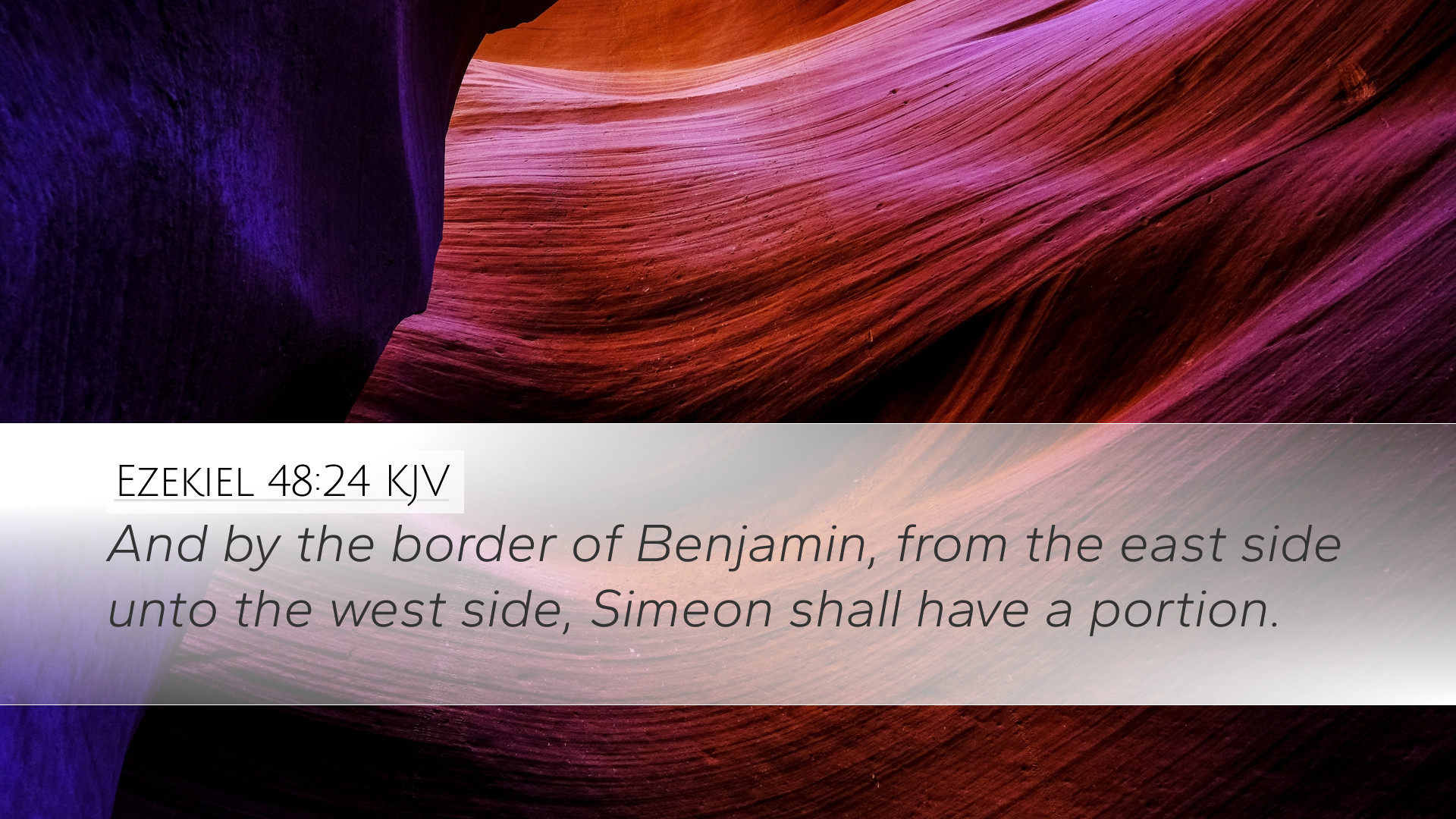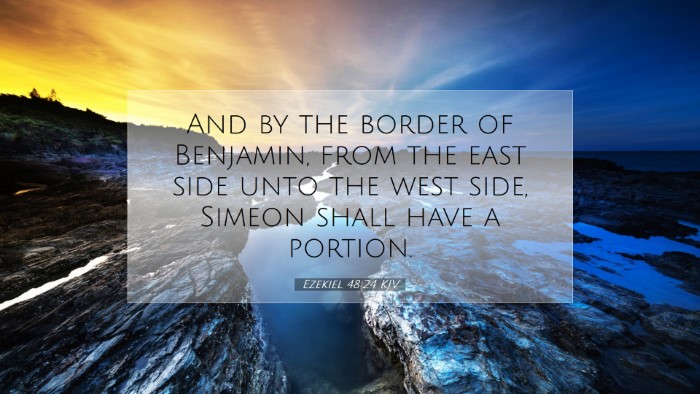Ezekiel 48:24 - Commentary Summary
Bible Verse: "And by the border of Benjamin, from the east side unto the west side, Simeh shall have a portion." (Ezekiel 48:24)
Contextual Overview
This verse appears at the conclusion of Ezekiel’s detailed description of the new Israelite land distribution, a vision granted to him by God concerning the future of His people. The broader context of Ezekiel 48 unfolds the symbolic and prophetic significance of the land allocation that reflects God's covenant faithfulness and the restoration of Israel.
Insights from Commentaries
Matthew Henry's Commentary
Matthew Henry emphasizes that Ezekiel is a key prophet, tasked with delivering messages of hope and restoration following Israel's exile. In his reflections on verse 24, he notes that the land is divided amongst the tribes in a manner that underscores God’s order and righteousness. Henry underscores the symbolic nature of the divisions, stressing that each tribe, including Simeon, has a specific inheritance which represents their identity and God's promise to them.
Henry also draws attention to how the inclusion of the tribe of Simeon signifies God’s desire for all tribes to be restored to their rightful place. The message is one of unity and belonging, inviting reflection on the importance of each tribe's role in the covenant community of Israel. He posits that the organized distribution of land serves as a metaphor for the organization and order of divine providence in the church today.
Albert Barnes' Commentary
Albert Barnes offers a detailed interpretation of the geographical significance and historical context of the land allotment in Ezekiel 48:24. He elaborates on the boundaries of the tribally defined territories. Barnes states that this allocation reflects God's promise and the fulfillment of His covenant with the patriarchs. Notably, he highlights that the mention of Simeon’s portion signifies a fulfillment of Jacob’s blessing, where Simeon was included even though they had historically been a lesser tribe due to their past actions.
Barnes further explains that the listing of boundaries from east to west serves a dual purpose: first, it provides practical insight for the people regarding their inheritance and second, it serves as a theological reminder of the unity of God's people which transcends historic grievances and divisions. He implies that this divine arrangement signals the hope of a renewed community, one defined by peace and aligned with God’s intended order.
Adam Clarke's Commentary
Adam Clarke's analysis underscores the theological implications of land allotment, centering on the significance of territorial possession in the life of the Israelites. Clarke notes that Simeon’s portion, tucked between Benjamin’s and the surrounding territories, symbolizes the central role of this lesser tribe in the restored order. He comments on the meticulous enumeration of tribal territory, reflecting the precision with which God administers justice in the community.
Clarke draws attention to the spiritual relationships embedded in these allocations, positing that they serve as patterns for contemporary believers. The division of the land is not merely about geography but encapsulates God’s intention for His people to dwell securely and maintain their distinct identity in the world. He concludes by highlighting the theme of restoration, reinforcing that the future plan for Israel is to reclaim both land and relationship with God.
Theological Significance
The theological implications of Ezekiel 48:24 extend beyond historical Israel; they reverberate in the present ecclesial context. The passage invites a deep reflection on God’s faithfulness towards His people and the promise of restoration intrinsic to the gospel. Each allocated portion represents a reminder of belonging, a key theme in Christian identity.
Applications for Pastors, Students, and Theologians
- Pastoral Insights: This verse encourages pastors to reflect on the importance of belonging and inclusion within the church. Just as the tribes had their distinct places, every member of the congregation holds significance in God’s kingdom.
- Theological Reflection: The verse serves as a theological anchor for discussions regarding God’s unchanging nature and His promises. It promotes a framework for understanding God's work through historical and contemporary ecclesiologies.
- Encouragement for Students: The study of land division reminds students in theological education of the narrative continuity throughout Scripture and the faithfulness of God in Israel's history, which enriches their understanding of the biblical text.
- Scholarly Pursuits: Scholars may explore the historical and archaeological implications of specified land allocations, assessing the balance between literal and figurative interpretations within biblical texts.
Conclusion
Ezekiel 48:24 stands as a profound testament to God's deliberation and faithfulness in providing for His people. The commentary insights remind us that this passage holds multifaceted meanings and applications for today’s faith community. This restoration and ordering of land is not just a relic of ancient history but serves to remind modern believers of their identity, purpose, and place within the ongoing narrative of God’s redemptive plan.


